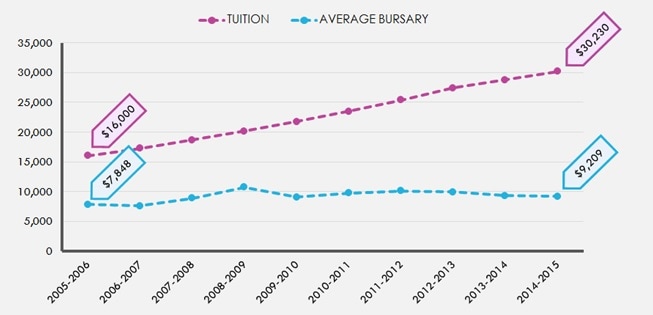Marcus McCann (Class of 2014)
A version of this talk was delivered to the University of Toronto Faculty of Law Class of 1975 Reunion on September 9, 2015. These remarks were first published on the Symes Street & Millard LLP blog on September 13, 2015.
I’ll keep this brief, because the message from the future is a bit of a downer.
Tonight is rightly about celebrating your talents and gifts. But as you think about all of your wonderful, hard fought accomplishments, I hope you will take what I say and think about what choices brought you to this point, and what gave you the freedom to make them.
I grew up in a modest income family in working class Hamilton. I financed law school through government student loans, faculty bursaries, and commercial loans. The faculty paid some of the interest on the commercial loans while I was in school.
That’s how most law students at U of T cobble together tuition and living expenses. Students now qualify for $150,000 lines of credit, plus about $35,000 in government loans.

It’s impossible to talk about financial aid without talking about tuition. It’s gone up a staggering 800 percent since 1997. It’s now more than $30,000 a year, the highest in the country.
Financial aid has failed to keep pace. The faculty used to report on the percentage of students who got full bursaries. Now, none do. While I was in school, they were still reporting the number of students who qualified for bursaries equal to half of their tuition. The last year they reported it, the number was two percent. Now, it’s fallen off their reports.
This can only affect the make-up of who goes to law school. The number of racialized students at U of T law has been stagnant in recent years. And the faculty doesn’t overlay real socioeconomic data onto this stat. So we have no idea whether this stat actually means that people from diverse economic backgrounds are coming. But anecdotally, my sense is that they are not.
High tuition and inadequate financial aid contributes to a tidal pull away from people-focussed work, away from public interest, away from Crown and government work, away from work at small firms.
It’s no wonder that my graduating class – I’m very proud of this – protested our own graduation.
I want to thank you for the care and concern you’re showing for students in situations that are like mine. It will mean a lot to them if the faculty, with your help, can fix the growing gap between tuition and financial aid. I understand Dean Iacobucci gave you a very soft sell on fundraising for financial aid. I’m not here to ask you for money.
But when the faculty does roll out their financial aid fundraising plan, which I imagine is coming, I encourage you to give. And when you do, I encourage you to ask lots of questions – to be your lawyerly selves, to be inquisitive, even interrogative. Is the current state of affairs a problem? What mistakes were made along the way? How do we avoid making them again?
I’d love to talk with you about this more. I’ll stick around tonight, and you can always find me online. Thanks again. You are and continue to be a remarkable class.





